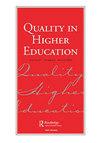日本学生学习成果的外部质量保证的作用:官僚主义和同行评议之间的证据评价
IF 1.5
Q3 EDUCATION & EDUCATIONAL RESEARCH
引用次数: 1
摘要
摘要:本研究探讨了外部质量保证在审查日本大学学习成果评估中的作用和挑战。有批评称,日本过度依赖入学考试的难度,而不是毕业生的能力,以此作为衡量某一院校质量的标准,因此,高等教育的透明度面临着更大的压力。认识到从旧的二分法到新的“三位一体”(问责制、改进和透明度)的转变,日本的认证推动了大学定义、评估和改善学习成果。本研究运用质量保证的双重逻辑(官僚制和同行评议),并通过对质量保证机构主要人员的访谈,揭示了同行评议的专业判断是定性的、情境的,甚至是哲学的,从而有助于在保持客观性和公平性的同时增强大学的独特性和多样性。此外,认证需要在大学中培养一种“证据文化”,以捕捉它们的主动性,并使这些努力具有经验意义。本文章由计算机程序翻译,如有差异,请以英文原文为准。
The role of external quality assurance for student learning outcomes in Japan: evaluation of evidence between bureaucracy and peer reviews
ABSTRACT This study examines the roles and challenges of external quality assurance in reviewing learning outcome assessments of Japanese universities. Following criticism that Japan has overly relied on the difficulty of entrance examination as a quality metric for a given institution, rather than graduates’ competencies, there is more pressure for transparency in higher education. Recognising the shift from the old dichotomy to a new ‘trinity’ (accountability, improvement and transparency), Japanese accreditation has pushed universities to define, assess and improve learning outcomes. Applying the double logic of quality assurance (bureaucracy and peer review) and employing interviews with key quality assurance agency personnel, this study shows peer reviewers’ professional judgment as qualitative, contextual and even philosophical, thus helping enhance a university’s uniqueness and diversity while maintaining objectivity and equity. Furthermore, accreditation needs to cultivate a ‘culture of evidence’ in universities to capture their initiatives and make such efforts empirically meaningful.
求助全文
通过发布文献求助,成功后即可免费获取论文全文。
去求助
来源期刊

Quality in Higher Education
EDUCATION & EDUCATIONAL RESEARCH-
CiteScore
3.30
自引率
14.30%
发文量
32
期刊介绍:
Quality in Higher Education is aimed at those interested in the theory, practice and policies relating to the control, management and improvement of quality in higher education. The journal is receptive to critical, phenomenological as well as positivistic studies. The journal would like to publish more studies that use hermeneutic, semiotic, ethnographic or dialectical research as well as the more traditional studies based on quantitative surveys and in-depth interviews and focus groups. Papers that have empirical research content are particularly welcome. The editor especially wishes to encourage papers on: reported research results, especially where these assess the impact of quality assurance systems, procedures and methodologies; theoretical analyses of quality and quality initiatives in higher education; comparative evaluation and international aspects of practice and policy with a view to identifying transportable methods, systems and good practice; quality assurance and standards monitoring of transnational higher education; the nature and impact and student feedback; improvements in learning and teaching that impact on quality and standards; links between quality assurance and employability; evaluations of the impact of quality procedures at national level, backed up by research evidence.
 求助内容:
求助内容: 应助结果提醒方式:
应助结果提醒方式:


